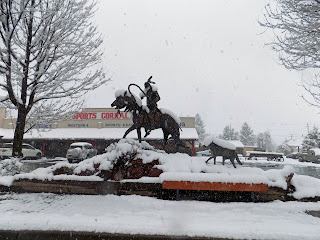By Michael Nettleton
I’m no dummy.
No, this not a debate topic. (Sit down,
Carolyn.)
But I’d be the first to admit . . . (Carolyn
waving hand frantically to get my attention.) Okay, okay, I’d be the second to
admit that figuring out technical and mechanical stuff is not my strength.
It took only about fifteen minutes of my
freshman calculus class to send me skittering to another building to relaunch
my scholastic career as a liberal arts major. I may not handle multi-level
equations very well, but I can analyze the crap out of Shakespeare. You need to
know how not to bump into the furniture on stage? I’m your guy. Great Hadron
Collider or how to fix venetian blinds? Not so much.
Once, while working as a substitute
librarian, I was shelving books in the science section. My eye fell upon a soft-covered
volume called Quantum Physics for Dummies. I scooped it onto my soon-to-be
empty cart and took it to the front desk, bravely entered my library card
number, and checked that puppy out. How hard could it be? This book would lay QP
out step-by-step. I felt my inner Stephen Hawking rising to the challenge. I
could even swallow my pride and overlook the For Dummies part of the
title. (Reference opening sentence.)
Later, at home, having spent a quality
two hours trying to make my way through the opening chapter, my loving life
partner Carolyn tapped me on the shoulder.
“You want I should call and have them
bring the Jaws-of-Life?” She queried.
At that point, all I could produce,
vocally, was a pathetic mewling that might have contained the words ”what?” and
“for?”
“To twist your head around and get it
facing the right direction on your shoulders,” she said, trying her best not to
smirk.
Which brings us to LED lighting.
Recently, we had a fluorescent light in
the garage flicker, then give up the ghost. Now I kinda-sorta understand how
fluorescent lights work. A
fluorescent lamp generates light from collisions in a hot gas ('plasma')
of free accelerated electrons with atoms. Simple, yes? Okay, okay, I looked it
up. But I’m within the general area code of understanding it.
Carolyn
decided to replace the gassy/lighty thinggummy with an LED fixture. More energy
efficient, longer lasting, better for the environment and blah, blah, blah.
She had our neighbor Mr. Tool Belt install it,
and it worked great. In fact, it was so bright, the first time she turned it on
my immediate reaction was to yell “I’ll buy the negatives.” (If you’re younger
than say, 45, there’s no chance you’ll get the joke. Unless you’re a fan of
noir movies.)
Later, we were talking about our new
light source and both admitted we had no idea how LEDs work. The odds of me not
knowing something Carolyn also doesn’t know are astronomical. Right up there
with picking 6 winning lottery numbers. This called for a drink and a quick
trip to Wikipedia. Here’s what it says:
A light-emitting diode (LED)
is a semiconductor light source that emits light
when current flows through
it. Electrons in the
semiconductor recombine with electron holes, releasing energy in
the form of photons.
“Electron holes. Photons. See, that
would have been my guess.” I nodded.
“Ly-uhhh!!!” Carolyn crowed. “And what’s
your definition of a photon?”
“It’s . . . err . . . um . . . A
facsimile you use when you can’t afford a real tawn.”
“Brepppp!” She hit the B.S. buzzer.
“What else does it say?”
The attainment of high efficiency blue
LEDs was quickly followed by the development of the first white LED. In this device
a Y3Al5O12:Ce
(known as "YAG" or Ce:YAG phosphor) cerium-doped phosphor
coating produces yellow light through fluorescence. The combination of
that yellow with remaining blue light appears white to the eye.
“Oooh-kay! Of course,” I tried to sound
assured. “Now it’s perfectly clear.”
“Breppppp!” Carolyn hammered the buzzer
a second time. “Tell you what.”
“What?”
“How about we settle on a simple
one-word explanation?”
Sensing my chance to stop dangling in
the wind, I nodded. “Sounds good to me. What do you suggest?”
“I was thinking magic. We just agree
it’s magic and move on.”
“You are the brains of the operation,
aren’t you?”
She beamed. “I do my best. Do you have
anything to add?”
“Well, there’s this. If you plow into
the couch on stage and tumble ass-over-teakettle on top of the people sitting
on it, stay in character and pretend you did it on purpose. The audience will
never know.”

















